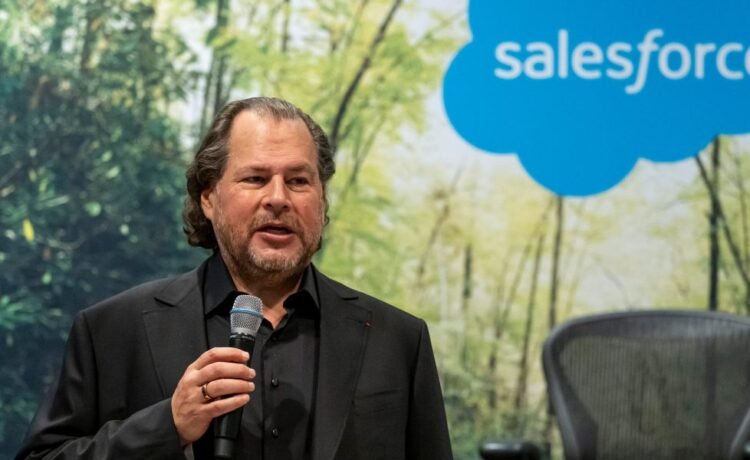
Salesforce CEO Marc Benioff, who is known for highlighting the transformative power of artificial intelligence, said AI can either replace us or enhance us.
He thinks it must be the latter.
“As the CEO of a technology company that helps customers deploy AI, I believe this revolution can usher in an era of unprecedented growth and impact,” Benioff wrote in a Financial Times op-ed on Thursday. “At the same time, I believe humans must remain at the center of the story.”
That’s because humans have a “superpower” that AI doesn’t, namely the ability to express compassion or truly connect with other people, he added.
Those uniquely human advantages have given rise to history’s greatest inventions as well as the formation of businesses that seek to solve the world’s problems.
Even with the emergence of AI agents that can learn and carry out tasks for us, Benioff maintained they will enhance, not replace, humans.
Still, he acknowledged AI is driving immense change across businesses, including his own. For instance, AI agents managed by humans are resolving 85% of customer service queries, and 25% of net new code for research and development was generated by AI in the first quarter.
“Jobs will change, and as with every major technological shift, some will go away—and new ones will emerge,” Benioff added. “At Salesforce, we’ve experienced this first-hand: Our organization is being radically reshaped.”
Thousands of employees have been redeployed, and hiring for engineering roles has largely been on pause, he explained. In fact, 51% of Salesforce’s hiring in the first quarter was internal.
His comments come as he and other tech CEOs have recently pointed out how much AI is doing now. Last month, Benioff said AI does up to 50% of all work at Salesforce, in key functions like engineering, coding, and customer support. In May, Microsoft CEO Satya Nadella said 20%-30% of the tech giant’s code is written by AI. And in April, Google CEO Sundar Pichai said more than 30% of code at his company is generated by AI.
Benioff also predicted at the World Economic Forum in Davos early this year today’s cohort of CEOs will be the last to lead all-human workforces.
Meanwhile, there are already signs AI is starting to wipe out some entry-level jobs that recent college graduates need to launch their careers.
Tony Fadell, the co-inventor of Apple’s iPod, added to those warnings earlier this week, telling Bloomberg TV all junior-level jobs in any industry are at high risk from AI and that schools need to train students to be more like mid-level employees.
“Businesses are not going to be training their workers like they used to, saying ‘I’m going to take interns and these things,’” he said. “They need to have experience, and experience—not just with the tools—but working experience before they’re actually going to the job market.”
For his part, Benioff stressed in the FT humans are not helpless, arguing we can choose to guide and partner with AI.
On the other hand, assuming AI will simply replace humans means “we begin to write ourselves out of the future.”
“AI is not destiny,” he said. “We must choose wisely. We must design intentionally. And we must keep humans at the centre of this revolution.”
You Might Also Like
Iran could use AI to accelerate cyberattacks on U.S. and Israeli critical infrastructure
Could Iranian hackers try to use AI to attack critical infrastructure in the U.S., Israel, and the Gulf States? The...
Great Wealth Transfer is already happening as millennials hitting ‘Peak 35’ are richer than ever
Thirty, flirty, and thriving. Forget the dirty thirties: millennials are now entering their era of earning, and they’re only going...
Gen Z’s enthusiasm for all things touchable is resurrecting the analog economy—and costing parents
Generation Z has unexpectedly become the primary driver behind the rapidly growing analog music and print book economies in the...
World shakes its weary head at more Trump tariff chaos as he ‘says a lot of things, and many of them aren’t true’
The latest twist in the U.S. tariff roller coaster ride, launched when President Donald Trump returned to office 13 months ago...










